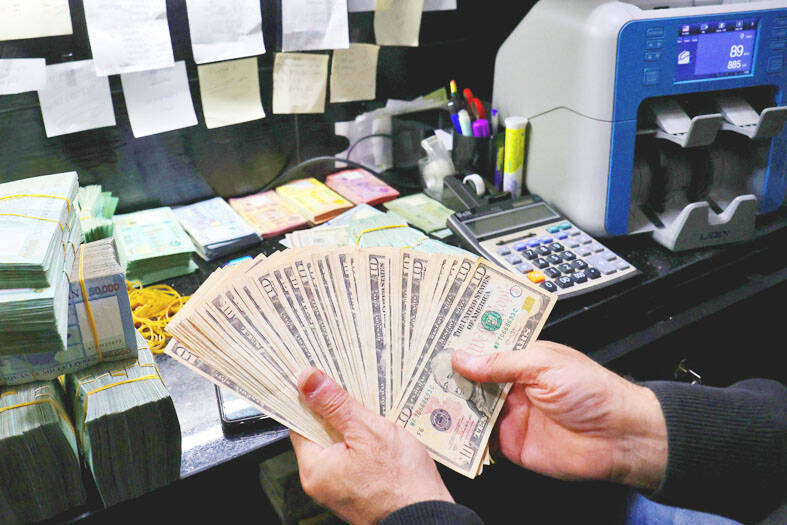The US dollar on Friday fell as further declines in the shares of Credit Suisse Group AG and First Republic Bank rattled markets fearful of contagion and increased concerns that a recession lies ahead because of the effects of tighter monetary policy.
An early recovery in European stocks ran out of steam as investor sentiment remained fragile after a week of turbulence following the failure of Silicon Valley Bank on March 10.
US banks have sought a record US$153 billion in emergency liquidity from the US Federal Reserve in the past few days, while the US$54 billion loan for Credit Suisse and US$30 billion lifeline for First Republic failed to halt their stock declines. Credit Suisse fell 8 percent in Europe and First Republic tumbled 30 percent.

Photo: AFP
The US dollar index, a measure of the dollar against six other currencies, fell 0.53 percent to 103.86, as traders waited for the Fed’s two-day policy meeting that is expected to end with a one-quarter percentage point hike in interest rates on Wednesday next week. The index fell 0.68 percent from the previous week.
Contracts for funds futures showed a 61.3 percent probability that the Fed will raise rates by 25 basis points, the CME Group’s FedWatch Tool showed.
Futures also showed that the Fed would have cut rates by July in a sign recession fears are mounting as the US central bank tightens monetary policy to fight high inflation.
Whether the banking turmoil of the past week leads to an immediate recession is hard to say, said Mazen Issa, senior foreign-exchange strategist at TD Securities in New York.
“It probably increases the probability that you do have a recession and perhaps it increases the probability that you may have a hard-landing scenario, a more severe recession dynamic,” he said.
“Once you have one regional bank go down, households question whether or not the regional banks are in trouble. That’s a natural human emotion to feel,” he said.
The New Taiwan dollar on Friday rose against the US dollar, gaining NT$0.77 to close at NT$30.554, up 0.24 percent from NT$30.848 a week earlier.
The yen fell 1.43 percent to ¥131.83 against the greenback, down 2.35 percent for the week.
Additional reporting by staff writer, with CNA

A wave of stop-loss selling and panic selling hit Taiwan's stock market at its opening today, with the weighted index plunging 2,086 points — a drop of more than 9.7 percent — marking the largest intraday point and percentage loss on record. The index bottomed out at 19,212.02, while futures were locked limit-down, with more than 1,000 stocks hitting their daily drop limit. Three heavyweight stocks — Taiwan Semiconductor Manufacturing Co (TSMC, 台積電), Hon Hai Precision Industry Co (Foxconn, 鴻海精密) and MediaTek (聯發科) — hit their limit-down prices as soon as the market opened, falling to NT$848 (US$25.54), NT$138.5 and NT$1,295 respectively. TSMC's

SELL-OFF: Investors expect tariff-driven volatility as the local boarse reopens today, while analysts say government support and solid fundamentals would steady sentiment Local investors are bracing for a sharp market downturn today as the nation’s financial markets resume trading following a two-day closure for national holidays before the weekend, with sentiment rattled by US President Donald Trump’s sweeping tariff announcement. Trump’s unveiling of new “reciprocal tariffs” on Wednesday triggered a sell-off in global markets, with the FTSE Taiwan Index Futures — a benchmark for Taiwanese equities traded in Singapore — tumbling 9.2 percent over the past two sessions. Meanwhile, the American depositary receipts (ADRs) of Taiwan Semiconductor Manufacturing Co (TSMC, 台積電), the most heavily weighted stock on the TAIEX, plunged 13.8 percent in

In a small town in Paraguay, a showdown is brewing between traditional producers of yerba mate, a bitter herbal tea popular across South America, and miners of a shinier treasure: gold. A rush for the precious metal is pitting mate growers and indigenous groups against the expanding operations of small-scale miners who, until recently, were their neighbors, not nemeses. “They [the miners] have destroyed everything... The canals, springs, swamps,” said Vidal Britez, president of the Yerba Mate Producers’ Association of the town of Paso Yobai, about 210km east of capital Asuncion. “You can see the pollution from the dead fish.

ASML Holding NV, the sole producer of the most advanced machines used in semiconductor manufacturing, said geopolitical tensions are harming innovation a day after US President Donald Trump levied massive tariffs that promise to disrupt trade flows across the entire world. “Our industry has been built basically on the ability of people to work together, to innovate together,” ASML chief executive officer Christophe Fouquet said in a recorded message at a Thursday industry event in the Netherlands. Export controls and increasing geopolitical tensions challenge that collaboration, he said, without specifically addressing the new US tariffs. Tech executives in the EU, which is